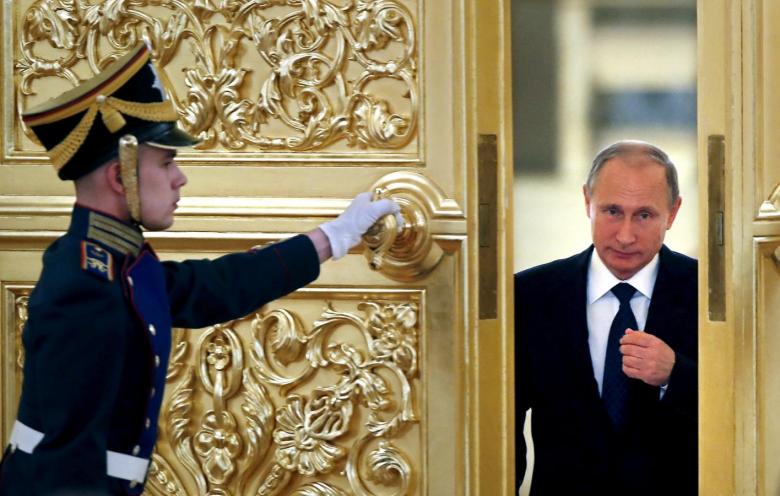As he was leaving the Kremlin, the visitor felt he had only few options: either to choose Russia’s vision on Syria and the gradual solution, or Iran’s plan in Syria and the never-ending war.
Those options are actually imposed by political and field developments on the Syrian arena.
Russian military intervention has changed the previous equation. Suicide bombers have hampered the efforts of the moderate opposition more than the regime forces.
The visitor listened to the decision-maker’s views on Russia’s role in the upcoming phase. Moscow is asked to conceive a solution no matter how long it takes; however, it is unable and unwilling to impose such solution.
The visitor understood that Moscow was seeking to find a solution based on three tracks: fighting terrorism – President Vladimir Putin’s top priority – which should be made in parallel with the second track that is negotiations between the regime and opposition forces on the paths of Geneva and Astana. The third track, which has not been practically launched, is the relation between Putin’s Russia and Donald Trump’s America – a relationship that Moscow sees as a possible opportunity to reach a comprehensive deal.
Moscow believes that time was a crucial weapon to conceive a solution and that leapfrogging would only lead to the continuation of war.
To those who say that Bashar al-Assad should leave, Moscow answers that currently there is no available alternative.
It takes into consideration Iran’s staunch opposition to ousting Assad from the equation. It suggests that Assad can stay until the 2021 presidential elections, and that he can leave after his defeat in the polls. It also signals that following his visit to Russia, Assad understood that the price for Russia’s military intervention should be paid at the appropriate time.
Countries, which are concerned with the Syrian people’s sufferings, have assumed this reality.
Trump’s America is unwilling to have a major role in the negotiations on Syria, which is already out of its influence zone and which is not appealing for the US to engage in big adventures in it, and later assume the responsibility of rebuilding the war-torn country.
Nothing in Syria makes the US bear the risk of having dangerous confrontations with Russia.
When it comes to pragmatic calculations, those countries prefer to see a Russian-made Syria rather than a country influenced by Iran. Russia’s military presence will not change the country’s features.
The presence of Russian naval forces along the shores of Tartus neither worries the West nor haunts Arabs’ minds.
Russia’s Syria is the least costly choice to get out of the Syrian swamp.
The image of the Russian representative to the Middle East has changed. It is no longer what it used to be during the times of Boris Yeltsin and before the country’s military intervention in Syria. Journalists, who monitor the movements of Mikhail Bogdanov -Russia’s Deputy Foreign Affairs Minister and Putin’s special representative to the Middle East and Africa – have felt this change during the latter’s participation in the Arab League Summit in the Dead Sea.
When I asked Bogdanov whether the majority of countries prefer the establishment of a ‘Russian Syria’ rather than an ‘Iranian Syria’, he answered: “We don’t use these media expressions. A solution in Syria should lead to the establishment of Syria’s Syria, which means that the country’s unity, sovereignty and territorial integrity should be preserved in line with a constitution agreed by the Syrian people.”
Bogdanov said that the country’s fate and leadership should be in the hands of the Syrian people. He explained that internal divisions and civil wars push local warring parties to find foreign allies. However, he noted that when political solutions are reached, foreign military interventions are no longer justified and the withdrawal of these forces becomes evident.
The Russian diplomat stressed that the political solution leads to the pullout of foreign forces from Syria. He noted that any solution to the crisis should be based on the international legitimacy, the Geneva process, and the agreements reached during the meetings of the group of countries backing a political solution in Syria.
It is obvious that the Russian solution is witnessing some progress. Syria’s seat in the Arab League Summit remained vacant, while leaders’ speeches highlighted the need for a political solution, without preconditioning Assad’s departure, at least for the time being. Bogdanov was listening to those speeches and he seemed relaxed.
Following the summit, important declarations were made by the US, as well as by Turkey, which is actively engaged in the Syrian conflict.
US Secretary of State Rex Tillerson announced that the Syrian people would determine Assad’s fate “on the longer term”.
US Ambassador to the United Nations Nikki Haley went on to say that removing Assad was no longer a US priority.
It is now clear that for many countries, the war against terror rather than Assad’s removal has become a priority, even if there is near-consensus on the impossibility to reach a solution that would restore Syria to its pre-war level.
The Syrian crisis has now entered the Russian crossing, which is seen as a mandatory path. Accepting a Russian Syria as the route to Syria’s Syria requires a US-Russian deal and a decision by Iran to give up the dream on using Syria as a safe path to Lebanon and the Mediterranean waters.
